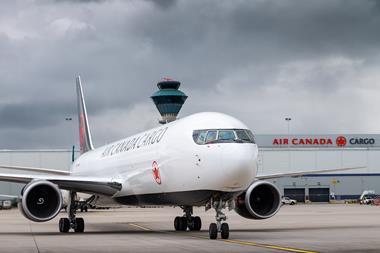
Air Canada has reached a tentative, four-year collective agreement with the Air Line Pilots Association (ALPA) trade union that is anticipated to put an end to industrial action plans that threatened cargo operations at the airline.
ALPA represents more than 5,200 pilots at Air Canada and Air Canada Rouge, which will both continue to operate as normal, said Air Canada in a statement.
“The new agreement recognises the contributions and professionalism of Air Canada’s pilot group, while providing a framework for the future growth of the airline,” commented Air Canada.
“Terms of the new agreement will remain confidential pending a ratification vote by the membership, expected to be completed over the next month, and approval by the Air Canada Board of Directors.”
The agreement is expected to mark the end of 15 months of discussions between Air Canada and ALPA over pay and conditions for pilots. Talks broke down at the end of August and Air Canada subsequently began preparing for potential pilot strikes.
Air Canada said last week that it was “finalising contingency plans to suspend most of its operations” in the face of possible industrial action.
If an agreement for pilots hadn’t been reached, as of September 15, operations could have been impacted by a 72-hour strike or lock-out notice and this would have triggered the carrier’s three-day wind-down plan, with flights progressively cancelled over the three days.
Cargo shipments and supply chains would have also been impacted by any strikes and the airline had already “begun limiting acceptance of some of these goods given average shipment timelines”.
Air Canada and Air Canada Rouge operate close to 670 daily flights on average.
In the event of a complete shutdown of operations, Air Canada had estimated it would take up to 7 to 10 days to resume normal operations.
Concerns about industrial action also prompted a group of business organisations to write to Canada’s federal government, urging action to avoid a strike and describing the potential for labour disruption as “alarming”.

















